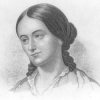Margaret Fuller

Margaret Fuller
Sarah Margaret Fuller Ossoli, commonly known as Margaret Fuller, was an American journalist, critic, and women's rights advocate associated with the American transcendentalism movement. She was the first full-time American female book reviewer in journalism. Her book Woman in the Nineteenth Century is considered the first major feminist work in the United States...
NationalityAmerican
ProfessionActivist
Date of Birth23 May 1810
CityCambridge, MA
CountryUnited States of America
We need to hear the excuses men make to themselves for their worthlessness.
There exists in the minds of men a tone of feeling toward women as toward slaves.
There is no wholly masculine man, no purely feminine woman.
The man of science dissects the statement, verifies the facts, and demonstrates connection even where he cannot its purpose.
Union is only possible to those who are units. To be fit for relations in time, souls, whether of man or woman, must be able to do without them in the spirit.
A man who means to think and write a great deal must, after six and twenty, learn to read with his fingers.
The highest ideal man can form of his own powers, is that which he is destined to attain. Whatever the soul knows how to seek, it cannot fail to obtain. This is the law and the prophets. Knock and it shall be opened, seek and ye shall find. It is demonstrated; it is a maxim.
Not one man, in the million, shall I say? no, not in the hundred million, can rise above the belief that woman was made for man ...
Tremble not before the free man, but before the slave who has chains to break.
Man can never come up to his ideal standard. It is the nature of the immortal spirit to raise that standard higher and higher as it goes from strength to strength, still upward and onward. The wisest and greatest men are ever the most modest.
I know of no inquiry which the impulses of man suggests that is forbidden to the resolution of man to pursue.
It should be remarked that, as the principle of liberty is better understood, and more nobly interpreted, a broader protest is made in behalf of women. As men become aware that few have had a fair chance, they are inclined to say that no women have had a fair chance.
Most marvelous and enviable is that fecundity of fancy which can adorn whatever it touches, which can invest naked fact and dry reasoning with unlooked-for beauty, make flowers bloom even on the brow of the precipice, and, when nothing better can be had, can turn the very substance of rock itself into moss and lichens. This faculty is uncomparingly the most important for the vivid and attractive exhibition of truth to the minds of men.
Man tells his aspiration in his God; but in his demon he shows his depth of experience.